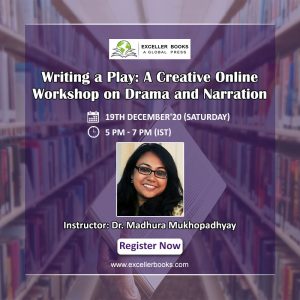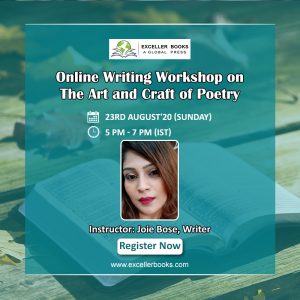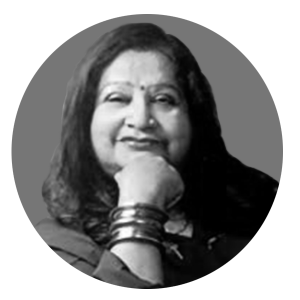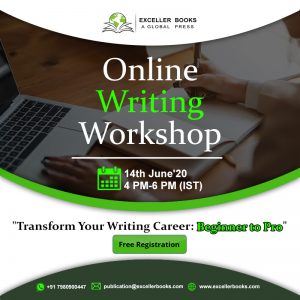Concluded Workshop 3
Our online workshop on Writing a Play: A Creative Online Workshop on Drama and Narration was conducted on 19th December, 2020. The workshop gave the participants a thorough understanding of the various forms of visual and narrative arts being in symmetry with each other leading to a form of cultural expression. The workshop was highly beneficial for both published and unpublished playwrights as they became aware of the various nuances of dramatic literature and important writing of scripts for plays and other forms of theatre. Many budding and aspiring authors, after participating in the session, gained confidence in their pursuit of becoming successful dramatists. The session was a wonderful learning experience for those looking for a thorough understanding about drama and narration. The workshop was of immense help for those who need guidance with composing, modifying, design and other creative aspects of a book.
Numerous registered candidates from different parts of the world took part in this workshop. Almost all the queries regarding drama and narration were solved in this 2-hour session and almost all the candidates were enriched with the necessary strategies they need to improve their existing manuscripts and have got the inspiration to publish their first book. The session was conducted by honorable Dr. Madhura Mukhopadhyay, an assistant professor at Amity Institute of English Studies and Research, Noida and it was moderated by Ms. Anjita Ganguly, the honourable co-founder of Exceller Books. All the essential aspects of drama and narration were discussed in this session. Some of them are:
- The history of theatre
- The definition of comedy and tragedy and their differences
- The definition of plot and its importance
- The definition and meaning of denoument
- The different kinds of characters and the different roles they play in a particular drama/ play
In this course, participants were privileged to learn some of the vital aspects of drama and play, such as:
- The difference between performance and mimesis
- The difference between a play and a drama
- The difference between farce and far lace
- The difference between a story and a plot
- The importance of having a tight script to keep the audience at the edge of their seats
Interactive Session
The course was organised in an interactive way where participants came up with a few questions as per their ability and understanding. This unique feature of the session made it a more interesting one.
- One of the participants asked the speaker whether it is necessary for a play to have a prologue
In reply to this question, the speaker, MadhuraMukhopadhyay, said that there is no strict rule for a play to have a prologue. It depends on the author whether he/ she wants to include a prologue to the drama.
- Another participant wanted to know how someone’s imagination can come into play while writing a play
In response to this question, she laid stress on imagination and said that imagination can become reality through visual arts. She also said that all the famous writers across the world have been able to pen heart-touching and memorable dramatic pieces with the help of their imagination.
- A participant came up with the question how many words should a drama contain and how many characters should it have.
The honourable instructor spontaneously answered this question by saying that it is not possible for any author to confine his/her writing to a particular number of words as it is based on the imagination. It completely depends on the topic you are writing about.
While answering the second question, she discussed about different categories of characters such as, round character, flat character, etc and opined that it is not necessary to have all those characters in a drama but they should be included according to the theme and plot of the story.
- Another participant wanted to know what kind of language should be used while writing a drama or a play.
The speaker suggested that the language that we use in our day-to-day life should be used in writing as communication is the key visual art. The easier you make for the audience, the better they can understand and can relate to what you want to convey through your writings.
- A participant asked if it is possible to kill the central character/protagonist on stage.
The instructor replied that the author has the liberty to kill the protagonist on stage if it can be staged aesthetically. However, there are audience with different age groups and different points of view, so, it’s completely up to them whether they would like it or not.

Conclusion
The participants appeared in the workshop; got the opportunity to go through an in-depth analysis of tragedies, comedies, melodrama, farce closet dramas, skits, tragic comedies, musicales, etc. Besides that, dramatic structure as a form of creative expression was explored here, along with dramatic writing as an immediate reaction to society. The participants have also learnt about the subtle differences between tragedy and comedy, a play and a drama, a story and a plot, etc and they will be able to use them properly in their future works. Dr. Madhura Mukhopadhyay, skillfully and effortlessly conducted the session as the participants never felt bored for one single moment. The knowledge gathered from this workshop will help the participants improve themselves as writers.
Feedback
The feedback of the students on the workshop went beyond our expectation. Since, Madhura Mukhopadhyay, an expert herself, shared all her knowledge and experience on drama and narration for the benefit of the aspiring authors; there is no doubt that the workshop session will be a successful one.
Instructor
Dr. Madhura Mukhopadhyay is an assistant professor at Amity Institute of English Studies and Research, Noida. She completed her Bachelor of Arts in English Literature (Honours) from esteemed Presidency College under Calcutta University. Thereafter she went on to complete M.Phil and Ph.D. both from prestigious Jawaharlal Nehru University, New Delhi. Her primary research area covers theatre and Canadian National Consciousness after 1960. She is also a recipient of the Canadian Commonwealth Fellowship 2012.
Concluded Workshop 2
Our online writing workshop on the Art and Craft of Poetry was conducted on 23rd August, 2020. The workshop gave the participants a thorough understanding of the difference between the philosophy of a poem and how to craft it in a manner that appeals to the self and the audience. The workshop also helped the participants understand how brevity is more effective as a poetic narrative style than elaborate prose on one hand but also acquaint the participants with the concept of prose poems. Everyone has a poetic self inside, but most of the budding poets find it difficult to recognise it and hence fail to grasp and put their thoughts on paper in the form of poetry. This is where the art and technique of comprising poetry becomes so vital. The workshop was of immense help for those who are looking to publish their first poetry collection and need guidance with composing, modifying, design and other creative aspects of a book or those who are keen to learn the skill of giving shape to your poetic imagination.
Numerous registered candidates from different countries across the world participated in this workshop. Almost all the queries regarding the art and craft of poetry were solved in this 2-hour workshop and all the participants, especially the aspiring poets who were seeking a thorough understanding of poetry certainly became enriched with insights and inspired by a passion for poems. The session was conducted by Ms. Joie Bose, a poet by heart and it was moderated by Mr. Sudipta Kumar Ghosh, the honourable founder and chief of Exceller Books. All the essential aspects of poetry were discussed in this online workshop. Some of them were:
- What is the definition of a good poem and what makes a poem better than the others. The poem Daffodils written by William Wordsworth was described by the instructor as an allusion to a good poem.
- The importance of using different poetic devices such as simile, metaphor, refrain, etc. was discussed here.
- The instructor casts some light on the contemporary poetic forms such as Haiku, Haibun.
- The participants got a vivid understanding about sonnets, a particular form of poetry.
- The term ‘prose poem’ was introduced in this session.
- In the workshop the participants came to know that like other literary works, it is very much important to have a proper climax at the end of a poem.
- What is Catharsis in a Poem and how can a poet develop the style of writing were also discussed here.
In this course the participants were privileged to learn some of the essential aspects of poetry. They were:
- At first, the candidates were introduced to poetry so that they could easily understand and feel the essence and beauty of poetry.
- The proper use of different poetic devices can bring them the desired success as a poet.
- The aspiring poets got a clear picture of the various forms and types of poetry and they also learnt how to discern the right one according to their purpose.
- The participants also became aware of the art to develop an expression native to your experience.
Interactive Session
The course was organised in an interactive way where participants came up with a few questions as per their ability and understanding. This unique feature added more flavors to the workshop.
- One of the participants asked the speaker about the significance of the philosophy of a poem.
The speaker, Ms. Joie Bose spontaneously answered the question as she said that a poem without a philosophy is like a man without any purpose. She further elaborated that a poem manages to make a lasting impression on the minds of the readers not because of the poet but because of its philosophy.
- A participant wanted to know how much important it is as a poet to appeal the audience besides appealing to the self.
In response to this question she said that unless a poem appeals the audience, it will never fulfill the true purpose of your writing a poem. Hence, it is highly essential for all the poets irrespective of published and unpublished to learn how to craft the poem in a manner that should appeal not only himself but also the readers. She continued if you want to make yourself an established poet, then touching the heart of the readers is the first and foremost thing to do.
- Another participant came up with the question of how to improve one’s vocabulary.
Ms. Joie Bose suggested going through journals and articles of newspapers and books on different topics in order to increase the vocabulary. She also advised to jot down any unknown word as soon as you come across it. She stressed on the fact that the more you will read, the more you will improve your vocabulary.

Conclusion
The participants appeared in the workshop were greatly benefitted as they became aware of many poetic devices and learnt the art of using them properly in their works. Also now they can clearly differentiate the philosophy of a poem and the method of making that poem appealing to the audience courtesy of the workshop. Apart from that different other aspects such as catharsis, prose poem, understanding of sonnets, etc were thoroughly discussed here. The instructor, Joie Bose, besides discussing about the art and craft of poetry, also shared her personal experience as a poet. The workshop was highly beneficial for all the participants and the knowledge they gathered from here will help them improve themselves as poets.
Feedback
The feedback of the students on the workshop went beyond our expectation. Since, a renowned poet like Joie Bose shared her knowledge and experience for the benefit of the aspiring poets, there is no doubt that the workshop session will be a successful one.
Instructor
Joie finds her ‘joie de vivre’ in Poetry and is popularly known as the Love Poetess for her love for poetry. She has authored two books of poetry – ‘Corazon Roto and Sixty Nine Other Treasons’ (Sampark, 2015) and ‘Amour – Hymns to Aphrodite’ (Author press, 2020) echo that. She also loves Calcutta and has edited two anthologies as a tribute to her city – Calcutta dotes (SNU Press, 2019) and Calcutta odes (Chair Poetry, 2019). Her writings have been featured in anthologies published by Sahitya Academy, Westland publication, Muse India and New Asian Writing. She has performed in London, Tokyo, Shanghai, Stratford and Hanoi amongst others. Her passion for literature has won her the Microsoft and GIZ Create to Inspire Fellowship (2015) Women par Excellence Award (2017), KKMR’s Award (2017) Nissim International Prize (2018) and Bharat Nirman Award (2019). She is the founder secretary of Poetry Paradigm and EC member, IPPL.
Concluded Workshop 1
Our Online Writing Workshop on Transform Your Writing Career: Beginner to Pro was conducted on 14th June, 2020. The main purpose of this workshop was to enhance the writing skills of the aspiring authors. This workshop was for anyone who feels they have a story inside them but cannot actually organize their thoughts on the paper; or maybe someone whose scripts is gathering dust due to lack of professional guidance; or someone who actually mastered writing but is clueless about how to set forth a profitable writing career.
150+ candidates registered for this workshop from 10+ countries from different parts of the world. They came up with a number of questions concerning the different aspects of writing and publishing. The Workshop was conducted by the Ms. Padmini Dutta Sharma, who is renowned published author. And session was moderated by our founder & chief Sudipta Kumar Ghosh. This course touched across all the essential areas of writing. Some of them were:
- How to hold on to the flow of thoughts consistently without deviating from the central storyline.
- Maintaining cohesion and collaboration with different characters, incidents and time.
- Developing universally appealing characters.
- Creating the twists and turns and the suspense factor.
- Playing with the intonations, tone, synonyms and phrases.
- Breaking the Chapters into sub chapters, tossing them to and fro/ backwards and forward; flashback effect.
- Managing procrastination, writer’s block, criticism, negativity throughout the writing phase.
- Working to become a bestseller with the right marketing strategy.
In This Course Students Learnt How to…
- Always Write for Yourself: Remember we all have a book inside us; the first page should generate interest and instantaneous connect with the readers.
- Keep the End in Mind: That is the most difficult part, joining all the dots without any hiccup. Catalysts are equally important.
- Read other writers of various genres and time, including classics.
- Jot down points whenever you get thought flashes, whether it’s the dead of night or break of dawn.
- Create unforgettable characters like Sherlock Holmes, Harry Potter, Tintin, Scarlett O’Hara, Rhett Butler etc.
- Self-edit Your Manuscript before submission: Always follow Ernest Hemingway’s policy – Write drunk, Edit sober.
- Take the help of a professional Editor.
- Generate the X Factor for Your Manuscript: From designing a book cover to procuring meaningful Reviews and forewords.
- Plan Your Release: Set a target release date and launch the book in style with a lot of fanfare.
- Go for Multi-Channel Distribution: Ensure it gets noticed and stands out in every platform.
- Decide the right publisher.
- Work on Marketing/Promotion/ Advertising/ PR.
Interactive Session (QnA)
The course was organised in an interactive way where participants were allowed to ask questions based on their understanding and experience. This unique feature made the workshop even more spontaneous.
- One of the participants asked the speaker, “Why have you decided to publish your 11th book with Exceller books?”
In reply to this question, Mrs. Padmini Dutt Sharma, the renowned Journalist and writer, elaborated on her experience with publishers she has faced so far. After publishing 10 books from a different publication houses, she was not satisfied. She realized that the process could have been handled more smoothly. But, after getting in touch with Exceller Books, she realized that we can carry out the entire publication process with Exceller Books in a more professional and efficient way.
- A participant requested the speaker to throw more light on the area of ‘making things easy for the readers.’
In the words of Padmini Ma’am, the authors should write their books in a simple yet interesting way. When a book is published, it is read by different kinds of people. If the author writes the book in a complicated manner, the readers may not relate themselves with the story and naturally lose interest after a few pages. So, the writer must always keep in mind the strengths and limitations of their target readers.
- One of the participants wanted to know about phonics and story books for children, and asked for the suggestion regarding the cover page.
Padmini man suggested while writing the books for children, the authors need to be extra careful about the choice of the cover page and the content as well. The cover of the book decides, to some extent, the fate of the book. The more attractive the cover is, the more number of people will get interested in the book. In case of children’s book, an eye catching book cover will get half the job done, since children will get easily attracted towards the cover and the book will be sold like hot cakes.
- One of the participating authors was doubtful about the margin and what exactly the font should be.
His doubt was cleared when she spoke elaborately on a suitable margin point and font size. Although, there is no strict rule or guideline regarding the font size and margin point, the aim of these things is to improve readability and give readers a pleasant viewing experience.
- One of the Nigerian participants told about the high publication cost and limited opportunity in Nigeria and was looking for a solution to publish cost effectively.
In response to this question she mentioned the benefits of going with Amazon Kindle distribution. She highly spoke about the advantage of multi-channel distribution and recommended Exceller Books for offering a 360 degree publication support including editing, proofreading, formatting, designing, cover creation, multi-channel distribution, high quality printing and marketing assistance – all in a very affordable package with EMI support.
- One of the participants was curious about the copyright issue and how an author can get a copyright for his work.
By writing a book, the authors automatically become the copyright holder of the book. But, to void any lawsuit in the future writers should always register copyright. Exceller Books can help you with this service.
- Another participant was keen to know if Exceller Books is limited in publishing e books and audio books only.
The speaker explains that Exceller Books is not only limited to publishing e-books and audio books but is also very much dedicated to the publication of traditional printed books. But, she agreed it is also true that, in the post COVID times, when people are mostly confined to their houses and printers are finding it difficult to operate, the only way the publishers can continue to cater to the e-books are audio books and e-books.
Conclusion
The workshop guided the participants through everything from writing your first draft to publishing your book. They learnt about how to decide the title, language and genre of the book; how to prepare an outline for your book and develop characters that fascinate the readers for years. This course also brought them a reminder that personal discipline is a major part of writing. She not only stopped at writing, but also offered the tested and tried marketing wisdom which can make your book a bestseller. Naturally, not only the newcomers but also veteran writers were immensely benefitted from this workshop.
Feedback
The students’ feedback on the workshop exceeded our expectations. Padmini Dutta Sharma who is a celebrated writer herself, offered first hand publishing knowledge and her secret recipe for success. So, when she gets a rating of 4.9, it was not surprising.
Instructor

Padmini Dutta Sharma is an internationally famed prolific writer with ten books of different genres to her credit. Most of her books are a runaway success with multiple editions doing their rounds in the global market. Padmini is a top notch columnist, reviewer and motivational speaker. Her stories, made into short films are every viewer’s delight. As a resource person Sharma has 360 degree experience in the creative publication industry!

